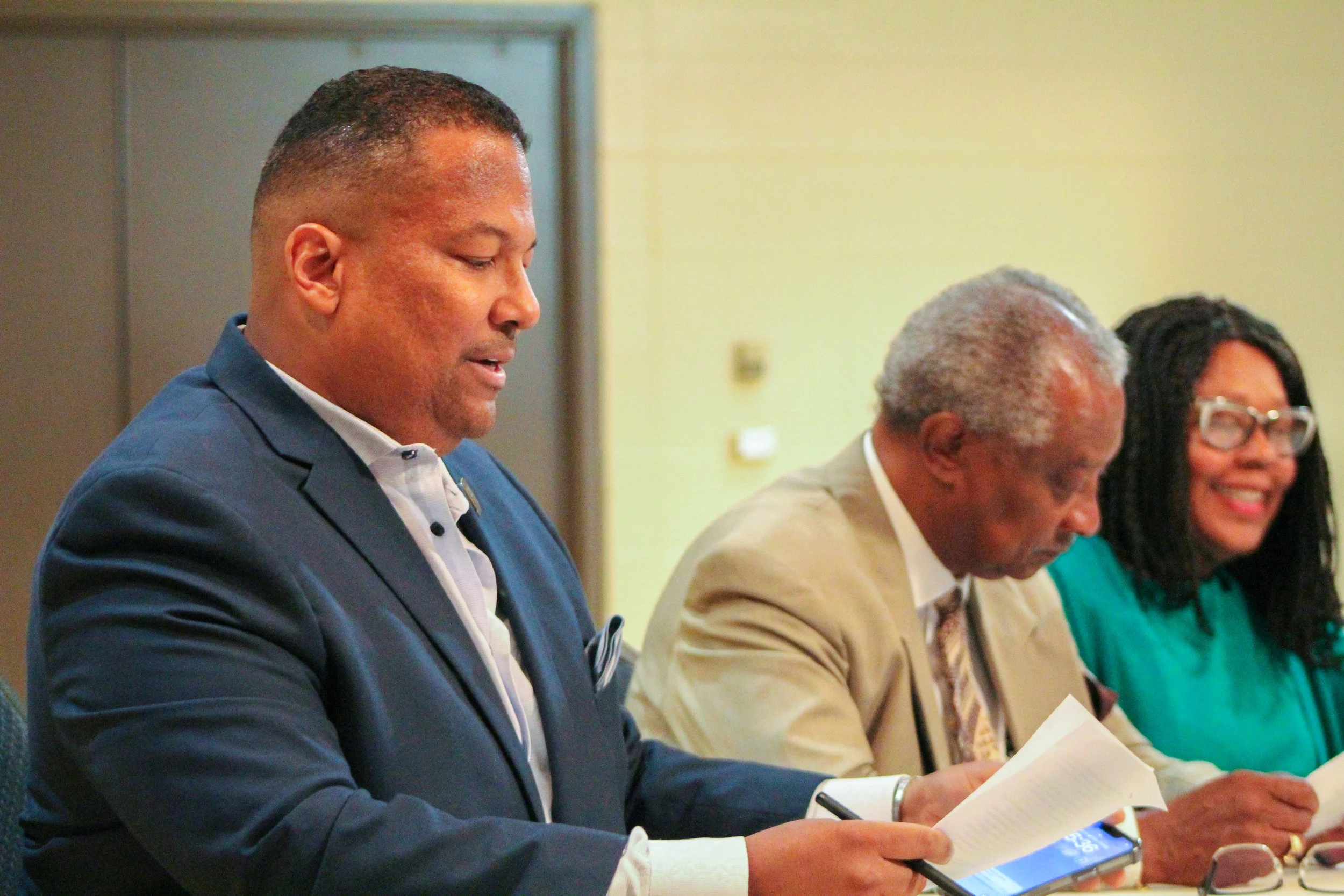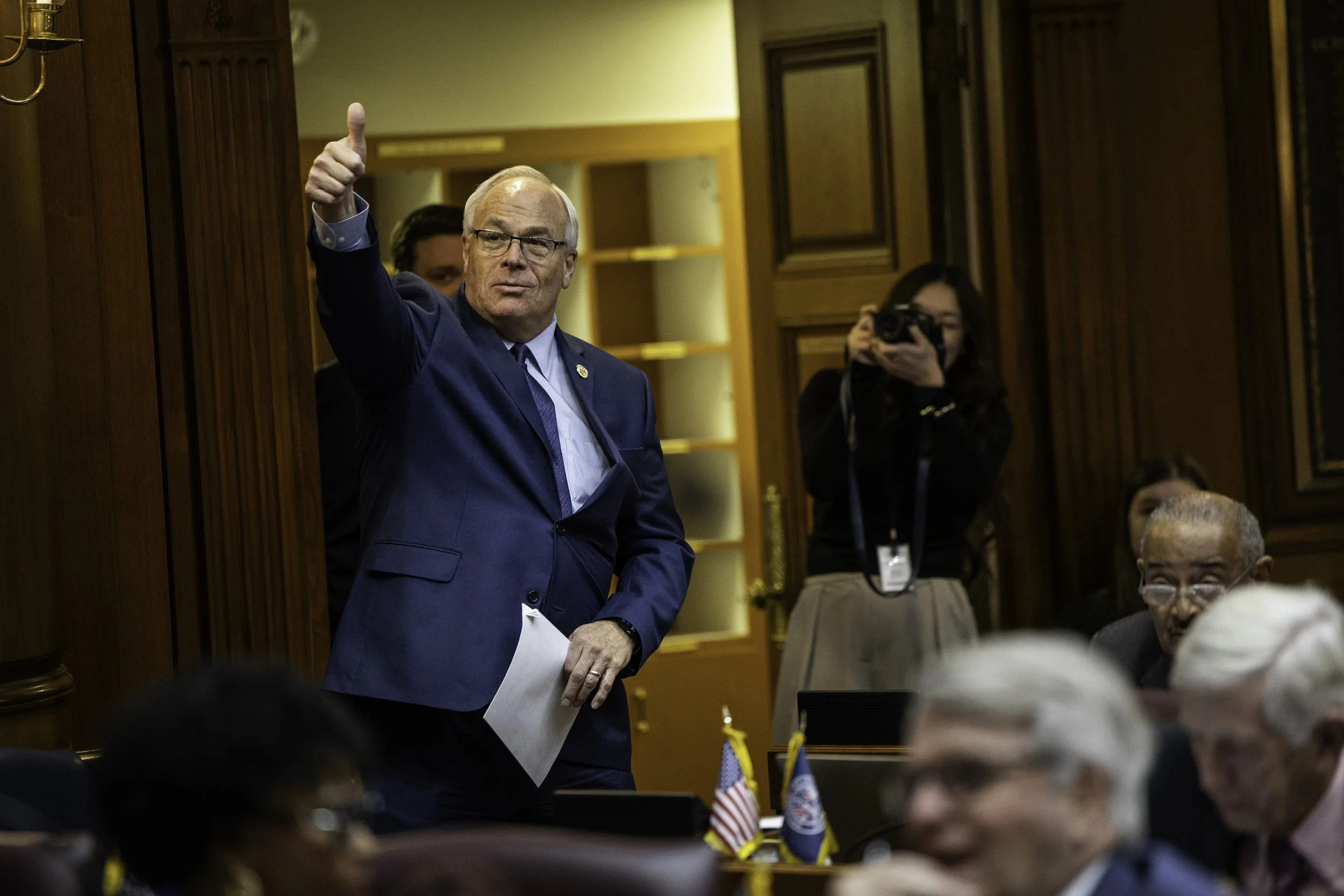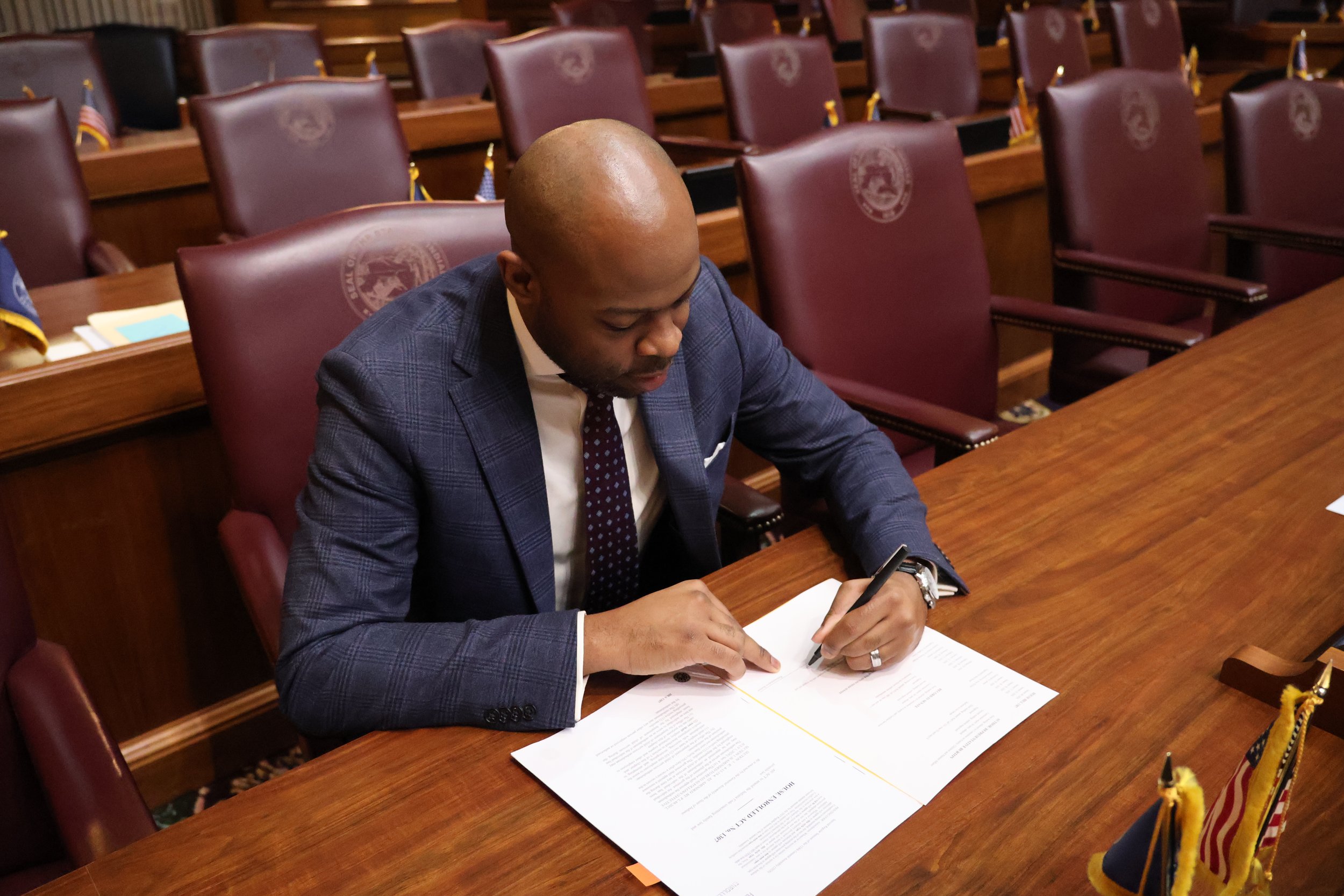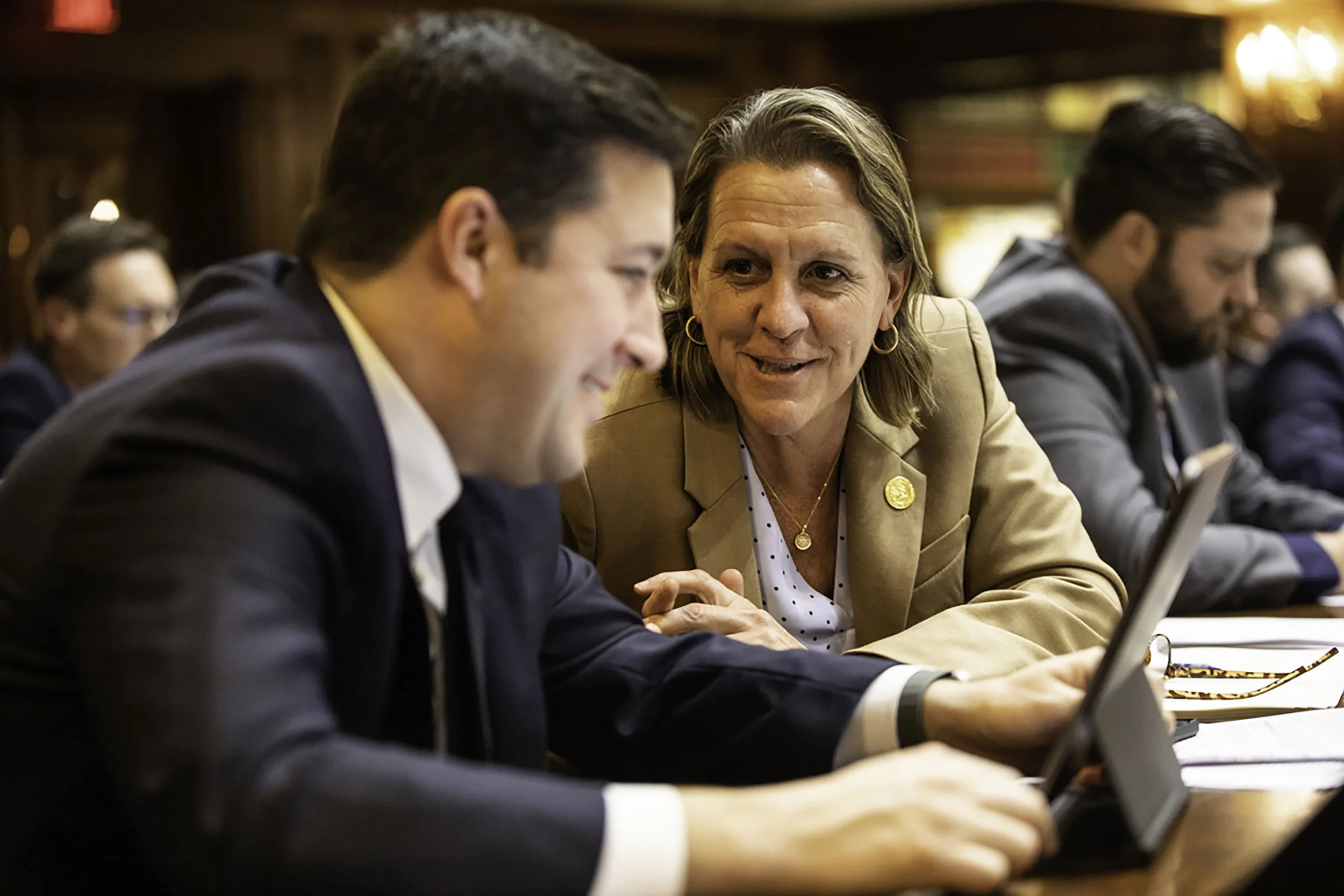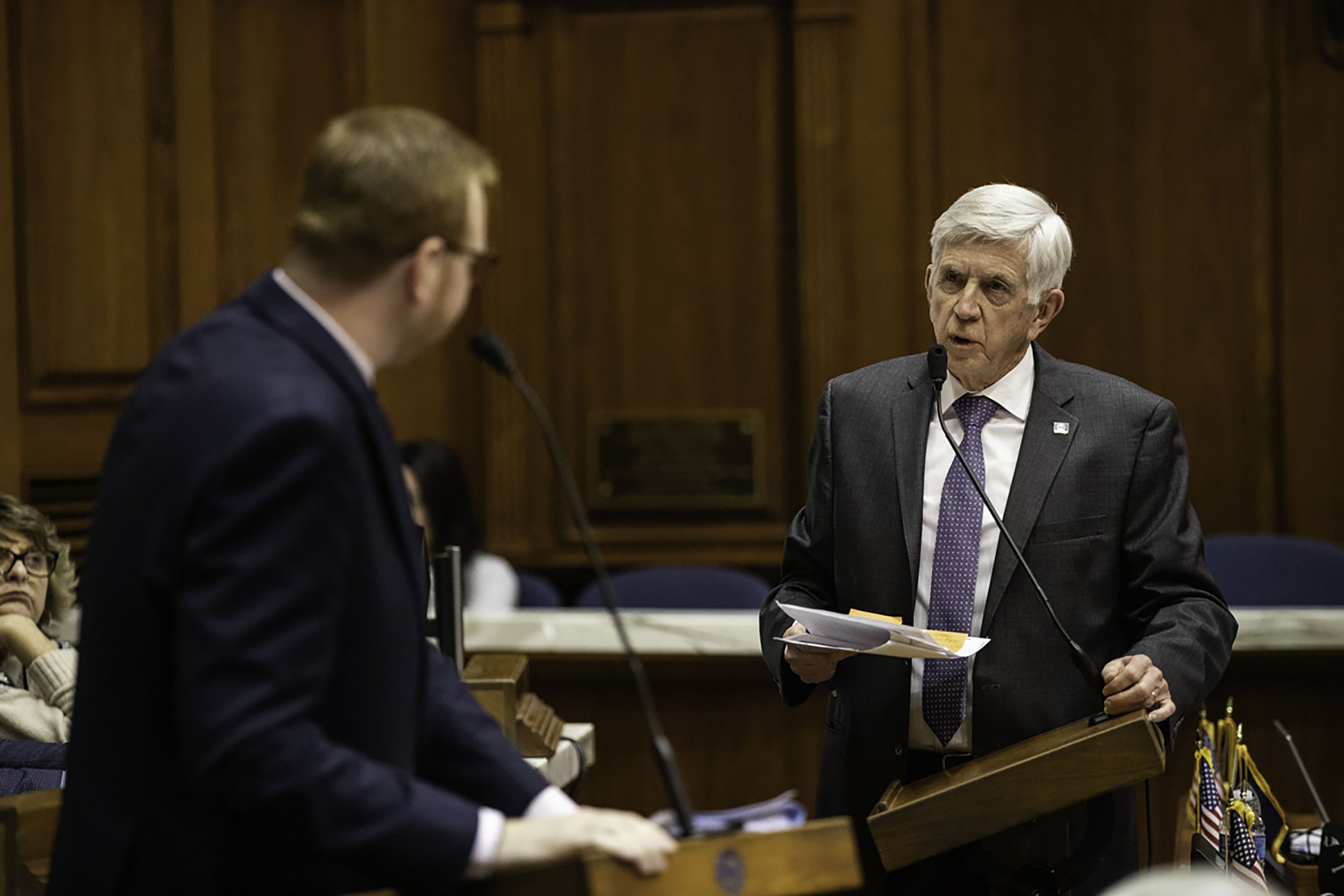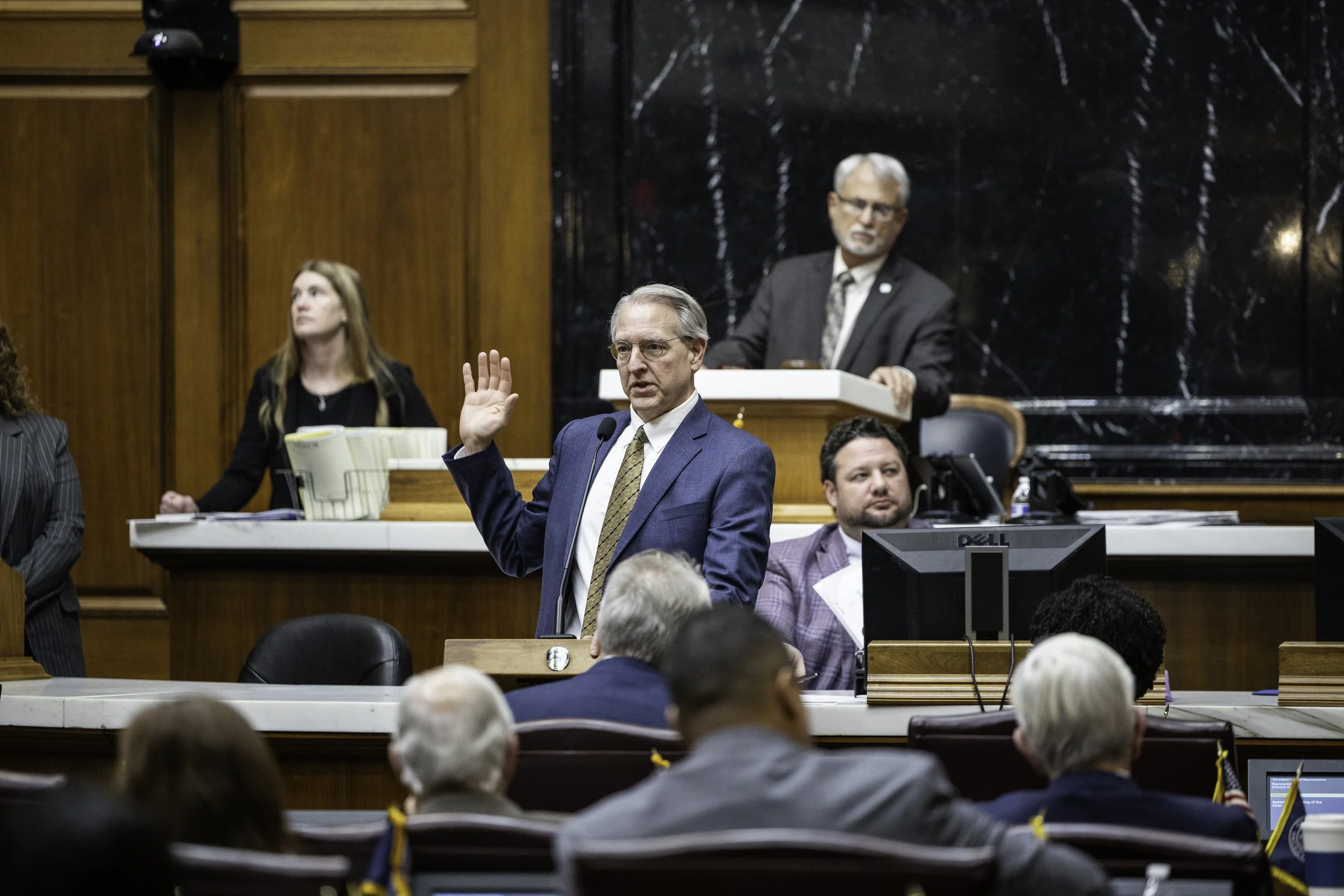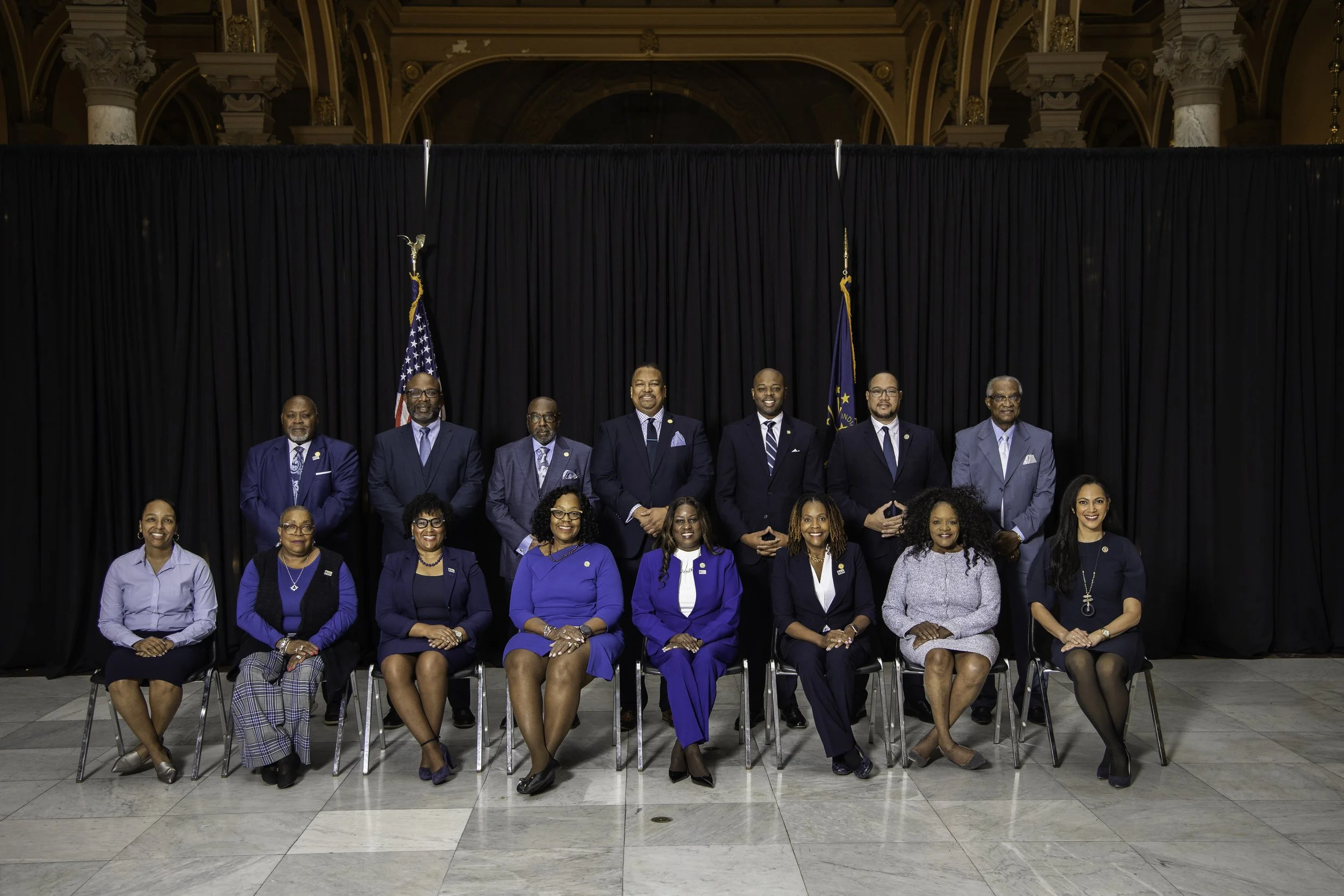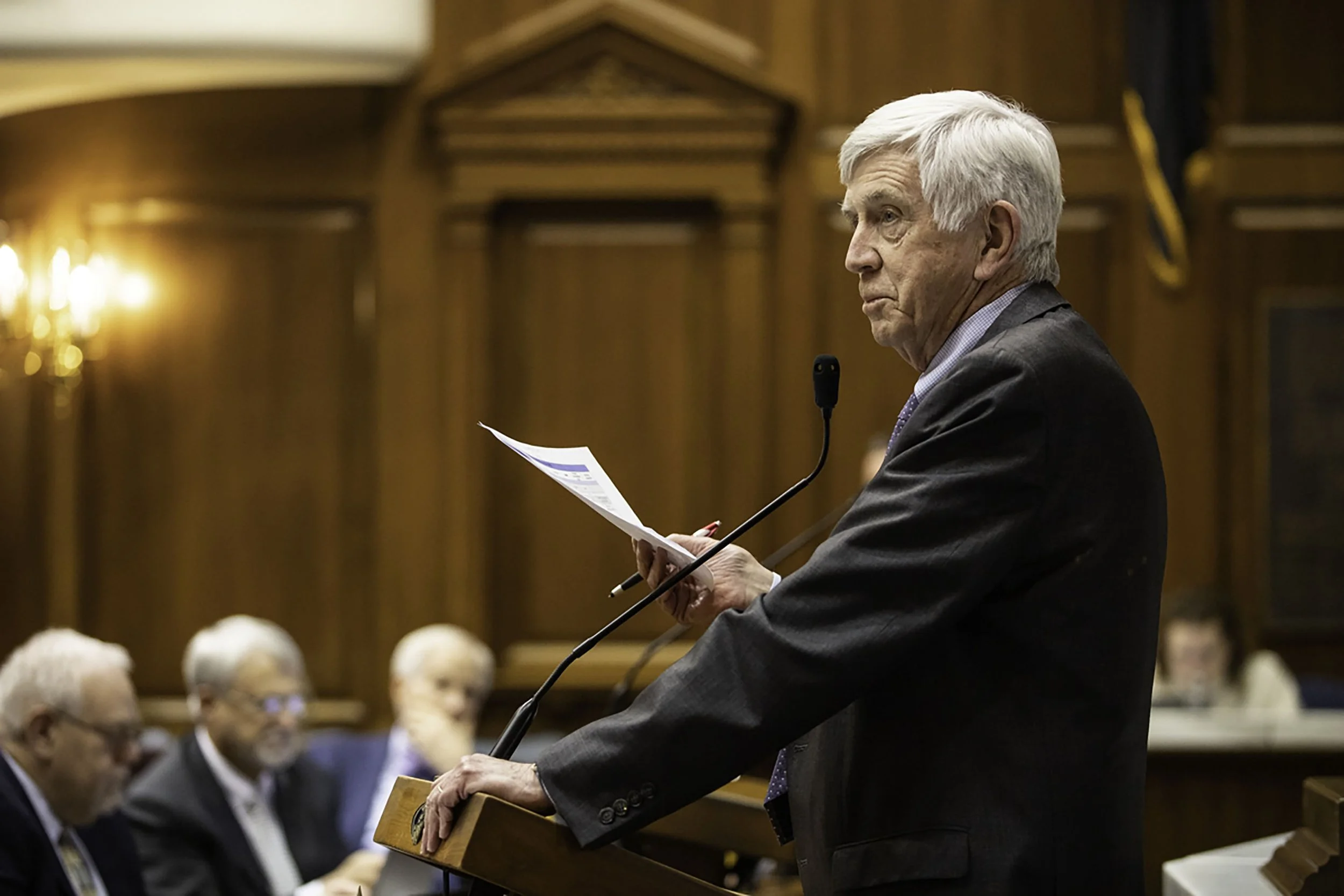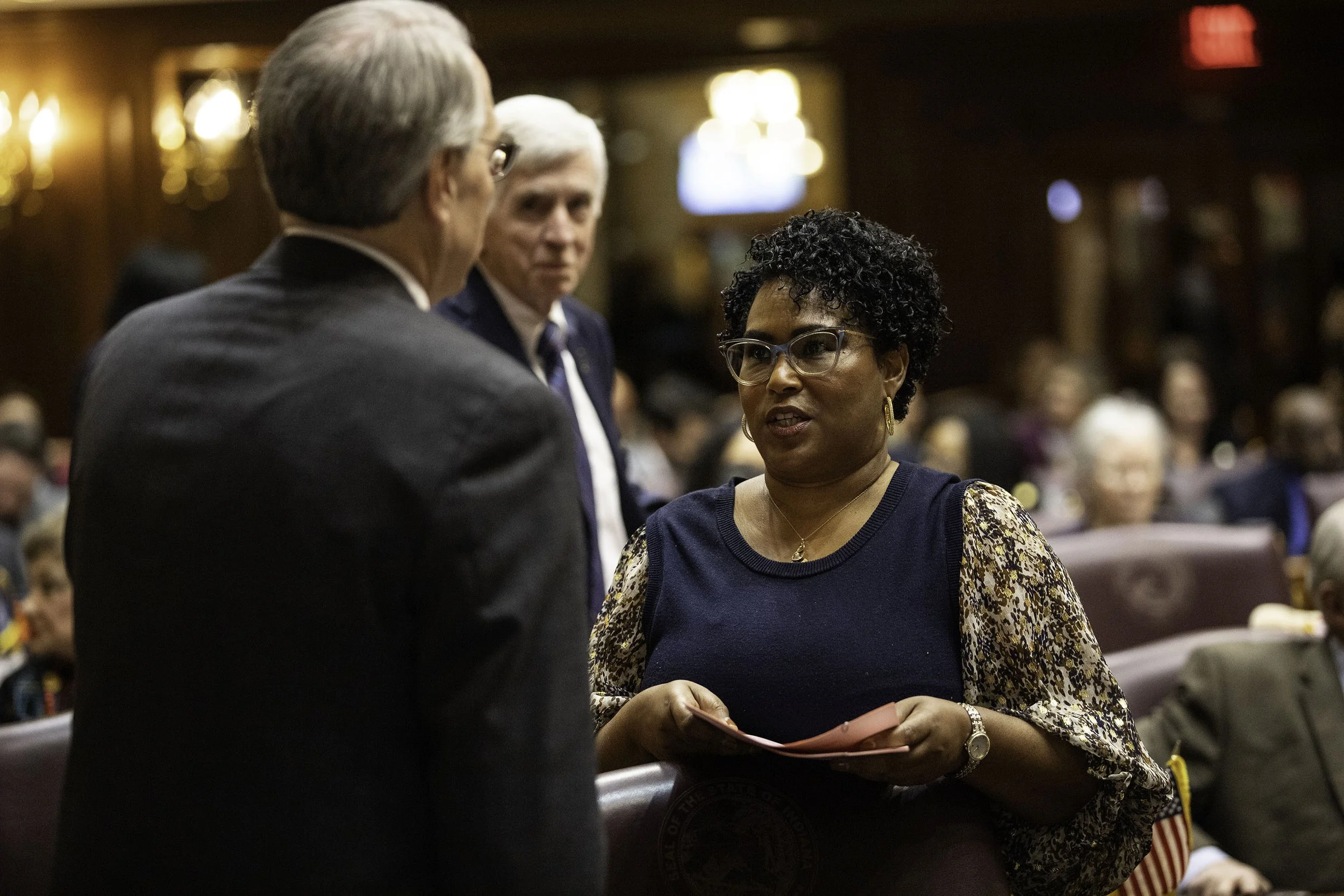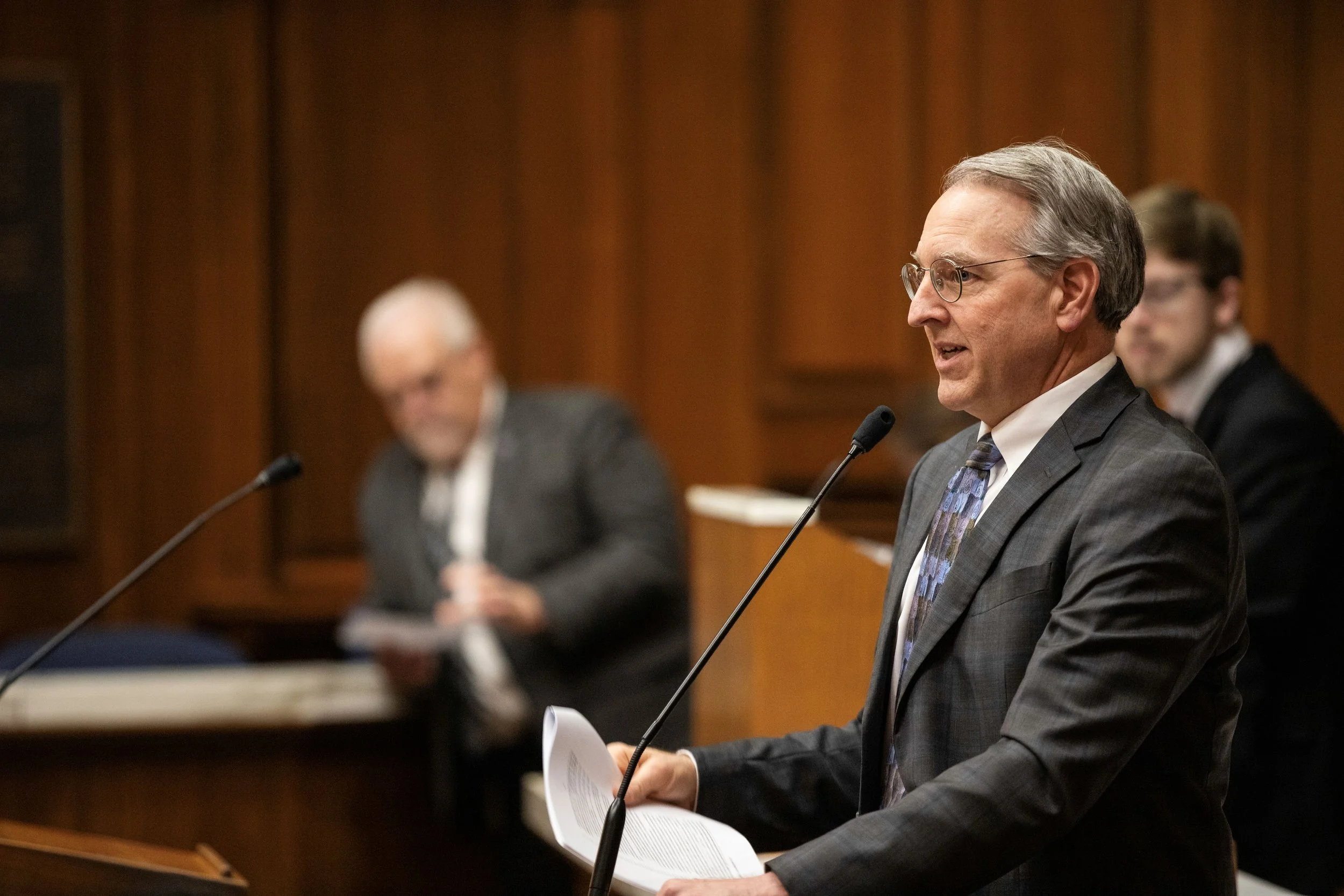Latest News
Find our archive of news distributions below. To request a media interview or statement from one of our members, visit our press inquiries page here.
Search Our Press Release Archive
Sort by Rep. or Topic
- Economy
- Education
- IBLC
- Leadership
- Mental Health
- Public Safety
- Rep Renee Pack
- Rep. Alex Burton
- Rep. Blake Johnson
- Rep. Carey Hamilton
- Rep. Carolyn Jackson
- Rep. Cherrish Pryor
- Rep. Chris Campbell
- Rep. Chuck Moseley
- Rep. Dant Chesser
- Rep. Earl Harris Jr.
- Rep. Ed DeLaney
- Rep. Gregory W. Porter
- Rep. John Bartlett
- Rep. Justin Moed
- Rep. Kyle Miller
- Rep. Matt Pierce
- Rep. Maureen Bauer
- Rep. Mike Andrade
- Rep. Mitch Gore
- Rep. Pat Boy
- Rep. Phil GiaQuinta
- Rep. Ragen Hatcher
- Rep. Randy Novak
- Rep. Renee Pack
- Rep. Robin Shackleford
- Rep. Ryan Dvorak
- Rep. Sheila Klinker
- Rep. Sue Errington
- Rep. Tonya Pfaff
- Rep. Vanessa Summers
- Rep. Vernon Smith
- Rep. Victoria Garcia Wilburn
- Rep. Wendy Dant Chesser
Harris: SB 27 creates a path toward prosperity in Northwest Indiana
Today, Feb. 19, Senate Bill 27 was amended in the House Ways and Means Committee and now heads to the House floor. The bill establishes the Northwest Indiana Stadium Authority to acquire and finance facilities in The Region.
Today, Feb. 19, Senate Bill 27 was amended in the House Ways and Means Committee and now heads to the House floor. The bill establishes the Northwest Indiana Stadium Authority to acquire and finance facilities in The Region.
State Rep. Earl Harris Jr. (D-East Chicago), issued the following statement:
"Bringing professional sports to Northwest Indiana – and all the economic benefits that come with them – was a priority for my father when he served in the Statehouse, and I'm proud to take part in continuing that work. As amended in the Ways and Means Committee, Senate Bill 27 prioritizes the growth of Northwest Indiana and the laborers who, quite literally, lay the foundation for said growth.
"In 2025, I authored House Enrolled Act 1292. This legislation established the Northwest Indiana Professional Sports Development Commission for the purpose of bringing professional sports to our community. Senate Bill 27 continues the work of bringing the Bears to Northwest Indiana. Bringing teams to Northwest Indiana and creating the infrastructure to support them will ultimately boost our local and state economy by creating jobs and bringing tourists to The Region.
"Senate Bill 27 is a bipartisan effort that creates a path toward prosperity in Northwest Indiana, and I look forward to working with my colleagues in the House and Senate to get this to the governor's desk."
Novak’s bill supporting volunteer firefighters heads to the Governor’s desk
Today, Feb. 18, State Rep. Randy Novak (D-Michigan City) filed for a motion to concur on the amendments added in the Senate to his House Bill 1048. HB 1048, which increases the yearly minimum allowance for volunteer fire department members from $100 to $250, helping offset the cost of essential clothing and vehicle-related expenses, now moves to the Governor’s desk for final approval.
Today, Feb. 18, State Rep. Randy Novak (D-Michigan City) filed for a motion to concur on the amendments added in the Senate to his House Bill 1048. HB 1048, which increases the yearly minimum allowance for volunteer fire department members from $100 to $250, helping offset the cost of essential clothing and vehicle-related expenses, now moves to the Governor’s desk for final approval.
Novak released the following statement on the bill’s advancement:
“I’m proud we got this done, especially in a short session where every minute counts. At the end of the day, this is about showing our support for the men and women who volunteer to protect our communities. This may be a small change in statute, but it makes a real difference. It’s a step in the right direction, and it sends a clear message that Indiana stands behind our volunteer firefighters.
"I appreciate my House co-authors, Reps. Chuck Moseley, Steve Bartels and Jim Pressel, our Senate sponsors, and everyone who took the time to reach out, testify and share their experiences. That input matters. Seeing this pass with bipartisan support reaffirms our commitment to set politics aside and do what’s best for the people we serve.
“There’s more we can do, and I’m committed to continuing the work to support the people who keep us safe. Let’s keep moving forward.”
To view updates on HB 1048, click here.
Burton’s bill to protect children in DCS heads to Governor’s desk
Yesterday, Feb. 17, House Bill 1307, authored by State Rep. Alex Burton (D-Evansville), passed out of the Senate and now heads to the Governor’s desk.
Yesterday, Feb. 17, House Bill 1307, authored by State Rep. Alex Burton (D-Evansville), passed out of the Senate and now heads to the Governor’s desk.
House Bill 1307 strengthens oversight of the Department of Child Services by requiring the DCS Ombudsman to actively investigate complaints, review cases where children may have been put at risk and make recommendations when problems are found. The measure is aimed at ensuring accountability and better protection for children and families across Indiana.
Burton released the following statement on the bill’s advancement:
“This is about the children. Plain and simple. When there are failures in the system, it is our responsibility to confront them head on. Indiana is sending a clear message that we will not look the other way when it comes to protecting our youngest Hoosiers.
“This legislation ensures that concerns are not brushed aside. It requires action. It demands accountability. And it strengthens the protections our children deserve.
“This has been a long time coming. I am grateful to my House co-authors, our Senate sponsors and every advocate, parent, caseworker and community member who shared their stories and pushed for change.
“Your voices made this possible. Protecting Hoosiers is not a partisan issue - it is a moral obligation. I am proud of the bipartisan support behind this bill and am hopeful for stronger safeguards because of HB 1307.”
Pfaff bill to improve coordination of services for students with special needs heads to Governor’s desk
On Monday, Feb. 17, House Bill 1325, authored by State Rep. Tonya Pfaff (D–Terre Haute), unanimously passed the Indiana Senate and now heads to the Governor’s desk.
On Monday, Feb. 17, House Bill 1325, authored by State Rep. Tonya Pfaff (D–Terre Haute), unanimously passed the Indiana Senate and now heads to the Governor’s desk.
HB 1325 requires the Indiana Department of Education, Department of Child Services, Department of Health and the Family and Social Services Administration to share data on services provided to children with special needs. The goal is to help the state better coordinate supports and identify gaps so families aren’t left to navigate systems on their own.
Pfaff issued the following statement after the bill’s passage:
“Hoosier families shouldn’t have to piece together services agency by agency, especially when they’re working to support a child with special needs. This bill helps state agencies coordinate and share information so we can take a clearer, data-driven look at what’s working, what isn’t, and where kids are falling through the cracks.
“As a retired teacher, I know every student deserves to be seen and supported. HB 1325 is a practical step toward making sure students with special needs get the coordinated care they need to learn, grow, and thrive.
“I appreciate the bipartisan support this bill received in both chambers, and I look forward to seeing it signed into law by Governor Braun.”
DeLaney urges full transparency after man dies in ICE custody at Indiana detention facility
Today, Feb. 18, a Cambodian detainee held at the request of the Immigration and Customs Enforcement at Miami Correctional Facility was found dead in his cell.
Today, Feb. 18, it was reported that a Cambodian detainee held at the request of the Immigration and Customs Enforcement at Miami Correctional Facility was found dead in his cell on Monday morning.
State Rep. Ed DeLaney (D-Indianapolis) issued the following statement:
“I have spoken to officials at the Department of Correction and urged them to conduct a thorough investigation of the death of this detainee. We need to ensure that our procedures and medical contractors are up to the task of appropriately caring for people in ICE custody.
“Public trust in ICE is near zero. Since the state of Indiana has decided to allow ICE to use our facilities, it is incumbent on us to ensure that the conditions in that facility are up to standard. Over the last few months, I have visited Miami Correctional Facility three times to see for myself that detainees are receiving proper treatment. I will continue to monitor this situation until we have a full public report of what happened to this detainee and receive proper assurance that there was no systemic failure that could cost another person their life.”
Porter bill increasing awareness for Alzheimer’s disease and dementia heads to governor’s desk
Yesterday, Feb. 17, the Indiana Senate passed House Bill 1029, sending it to the governor’s desk. The bill increases public awareness of Alzheimer’s and dementia through educational outreach. The Indiana Department of Health (IDOH) would need to add information to its website, include the two diseases in its existing public health campaigns and develop training opportunities for health care providers.
Yesterday, Feb. 17, the Indiana Senate passed House Bill 1029, sending it to the governor’s desk. The bill increases public awareness of Alzheimer’s and dementia through educational outreach. The Indiana Department of Health (IDOH) would need to add information to its website, include the two diseases in its existing public health campaigns and develop training opportunities for health care providers.
State Rep. Gregory W. Porter (D-Indianapolis) released the following statement:
“This isn’t a partisan issue. Alzheimer’s and dementia don’t see political party, race or economic class. These diseases affect everyone. That’s why education is so important. The more you know, the more you can do.
“Up to 35% of dementia cases are preventable. Young people need to know that information. Lifestyle changes, such as a healthy diet and regular exercise, can make a big difference. Middle-aged Hoosiers need to know the signs, since early detection is critical.
“This is also about helping families provide dignified care to our seniors. When I first started caring for my late mother, there was so much I didn’t know. I didn’t know how to handle her mood changes or her confusion. I learned as I cared for her. But the more we educate; the better prepared people are to care for their loved ones.
“I’m thankful that this bill is headed to the governor’s desk. I know this will make a difference in seniors' lives and the public’s welfare.“
House Republicans reject amendment to unmask ICE
Yesterday, Feb. 16, State Rep. Matt Pierce (D-Bloomington) offered an amendment to Senate Bill 160. The amendment would have required the Law Enforcement Training Board to adopt a statewide policy prohibiting officers from wearing a mask during official duties, with exceptions for situations such as tactical operations and undercover work. It also would have made it a class A misdemeanor for a law enforcement officer to wear a mask with the intent to commit or conceal the commission of a criminal act. It would have applied to federal law enforcement agencies, including Immigration and Customs Enforcement (ICE). House Republicans voted down the amendment 33-59.
Yesterday, Feb. 16, State Rep. Matt Pierce (D-Bloomington) offered an amendment to Senate Bill 160. The amendment would have required the Law Enforcement Training Board to adopt a statewide policy prohibiting officers from wearing a mask during official duties, with exceptions for situations such as tactical operations and undercover work. It also would have made it a class A misdemeanor for a law enforcement officer to wear a mask with the intent to commit or conceal the commission of a criminal act. It would have applied to federal law enforcement agencies, including Immigration and Customs Enforcement (ICE). House Republicans voted down the amendment 33-59.
Pierce released the following statement:
“I asked Republicans what kind of country and state they want to live in today. Do we want to live in a nation or state where masked agents with no identification can stop and demand proof of citizenship, and then arrest and send us off to a distant detention center?
“I don’t want to live in that kind of state or country. I don’t want to live in a place where masked agents demand to see your papers on the street. That is a big step towards authoritarian government.
“Republicans love to talk about the dangers of big government. We hear complaints about interference with property rights or too much regulation of businesses. Yet masked agents on the streets of America violating the constitutional rights of its residents, including unjustifiable killings, are met with deafening silence.
“This amendment was a chance for the General Assembly to stand up and demand the federal government respect our freedoms and liberties. Instead, Republicans said ‘no’ to preserving what so many of us took for granted.”
IBLC mourns passing of Rev. Jesse Jackson
Following the news of civil rights leader and politician Rev. Jesse L. Jackson's death on Feb. 17, State Rep. Earl Harris Jr. (D-East Chicago), chair of the Indiana Black Legislative Caucus (IBLC) issued the following statement on behalf of the IBLC
Following the news of civil rights leader and politician Rev. Jesse L. Jackson's death on Feb. 17, State Rep. Earl Harris Jr. (D-East Chicago), chair of the Indiana Black Legislative Caucus (IBLC) issued the following statement on behalf of the IBLC:
"Rev. Jackson dedicated his life to the service of others, from the Rainbow Coalition to protesting injustice in the United States to promoting democracy and human rights around the globe. He was led by his love for his fellow man and the belief that we're all better off when everyone has the opportunity to thrive.
"In the wake of this profound loss, I hope Rev. Jackson's life and work inspires us all to move through life with a moral compass calibrated toward justice and the resolve to work toward a better world for everyone."
DeLaney comments on national debt posturing by Statehouse GOP: ‘Let’s get serious’
Today, Feb. 16, Indiana State Comptroller Elise Nieshalla and the Braun Administration held a press conference with numerous state officials and lawmakers about passing a resolution to raise awareness about the National Debt.
Today, Feb. 16, Indiana State Comptroller Elise Nieshalla and the Braun Administration held a press conference with numerous state officials and lawmakers about passing a resolution to raise awareness about the National Debt.
State Rep. Ed DeLaney (D-Indianapolis) issued the following statement in response:
“Indiana Republicans have taken a page out of the old GOP playbook and decided to declare their focus on the national debt. It is encouraging to see that this issue still troubles my friends across the aisle. I was beginning to think that they had abandoned their concern for the national debt as they continuously celebrate the so-called ‘Big Beautiful Bill’ (BBB) that will increase the national debt by $3.4 trillion while depriving many Hoosiers of health care and food assistance.
“While Indiana Republicans offered lip service today about lowering the national debt, they have taken steps to import this fiscally irresponsible policy by bringing Indiana in line with the excessive cuts under the BBB. Under the bill passed this summer, the Congressional Budget Office (CBO) estimated that the national debt will exceed $52 trillion in the next decade – over $10 trillion above what the bill accounted for. As of October 2025, the national debt was accumulating at the fastest rate in history outside of the international emergency of the COVID-19 pandemic.
“Passing down a $52 trillion national debt to our children and grandchildren is irresponsible and unsustainable. Let’s get serious and prioritize popular programs that help Hoosiers instead of tax cuts for the mega-rich.
“Let our seven Republican congress members and two U.S. Senators get to work on the debt they vote on.”
Pryor concerned about civil rights violations under new immigration bill
Yesterday, Feb. 12, the Indiana House of Representatives passed Senate Bill 76 by a vote of 61-28. Since the bill was amended, it now heads back to the Senate for their approval of the changes before going to the governor’s desk.
Yesterday, Feb. 12, the Indiana House of Representatives passed Senate Bill 76 by a vote of 61-28. Since the bill was amended, it now heads back to the Senate for their approval of the changes before going to the governor’s desk.
SB 76 aligns state entities with current federal policy regarding undocumented immigration. Public schools and universities would be required to cooperate with federal immigration authorities, inviting Immigration and Customs Enforcement (ICE) into K-12 classrooms and college campuses. It would also empower Indiana’s attorney general to seek civil suits of up to $10,000 for violating these policies.
State Rep. Cherrish Pryor (D-Indianapolis) released the following statement on the bill’s passage:
“I am deeply disappointed in the passage of SB 76. SB 76 pressures state and local entities to act as pseudo-ICE agents, and diverts real public safety resources away from Indiana’s police forces and other services to pick up federal slack. Local units of government are already struggling because of Senate Bill 1 from last session. These measures will not help Hoosiers.
“This bill gives ICE the authority to walk into schools, universities, local government centers, hospitals and other institutions and disturb the peace of Hoosiers trying to go about their day. This will only cause already-tense situations to escalate and contribute to the ongoing trend of ICE agents’ racial profiling and detainment of law-abiding Americans. This could very well lead to the deaths of more United States citizens.
“The behavior we’re seeing from ICE in other states has no business spreading to Indiana, let alone using up local and state-level resources that should be used for the benefit of serving Hoosiers. They are being allowed to trample on our civil rights of American citizens. What right will be next. This is not who we are as Hoosiers or as Americans. For the sake of the dignity and respect of everyone who calls Indiana home, I implore the Senate and Governor Braun to give this bill the treatment that it deserves; kill this bill.”
Pierce rejects bill forcing all levels of state government, schools, and universities to assist ICE
Yesterday, Feb. 12, Senate Bill 76 passed the House of Representatives by a vote of 61 to 28. Because the bill was amended in the House, it returns to the Senate to approve the House changes or to request a conference committee to reconcile differences in the bill.
Yesterday, Feb. 12, Senate Bill 76 passed the House of Representatives by a vote of 61 to 28. Because the bill was amended in the House, it returns to the Senate to approve the House changes or to request a conference committee to reconcile differences in the bill.
SB 76 requires local governments, law enforcement, schools and universities to assist U.S. Immigration and Customs Enforcement (ICE), including complying with detainer requests. The state attorney general is given broad powers to investigate any of these entities he feels is not sufficiently compliant with ICE and to seek penalties against them.
State Rep. Matt Pierce (D-Bloomington) released the following statement:
"Why do we want to give our full, complete compliance to an organization that has proven itself to be poorly trained, incompetent, not able to follow our laws or constitution, and has caused the deaths of innocent U.S. citizens? We don't have to have this bill. We don't have to completely entangle our entire state with this deadly force that's spreading chaos and violence wherever it goes.
"It doesn't help that the bill gives our ethically challenged attorney general immense power to investigate and seek penalties against anyone he deems not sufficiently compliant with ICE. We should know better than to hand the attorney general this power."
Miller opposes Senate immigration bill
Today, Feb. 12, Senate Bill 76 passed out of the House by a vote of 61-28 and now heads back to the Senate with amendments. The bill aims to align state entities with current federal policy regarding undocumented immigration. It would bar schools, government bodies, and public universities from enacting any measures to limit cooperation with federal immigration authorities. It would also empower Indiana’s attorney general to seek civil suits of up to $10,000 for violating the new rules.
Today, Feb. 12, Senate Bill 76 passed out of the House by a vote of 61-28 and now heads back to the Senate with amendments. The bill aims to align state entities with current federal policy regarding undocumented immigration. It would bar schools, government bodies, and public universities from enacting any measures to limit cooperation with federal immigration authorities. It would also empower Indiana’s attorney general to seek civil suits of up to $10,000 for violating the new rules.
State Rep. Kyle Miller (D-Fort Wayne) released the following statement on SB 76’s passage:
“Senate Bill 76 will allow poorly trained federal agents to walk into classrooms, government buildings and university campuses and arrest people in broad daylight, often for little more than the color of their skin. Additionally, it would require local governments to comply with federal detainer requests, which would occupy space in jails that local municipalities need to detain violent criminals.
“This is an unnecessary and cruel bill. Masked men in unmarked vehicles are already terrorizing communities across the nation; the last thing Hoosiers need is for their state government to be helping these agents along their way.”


